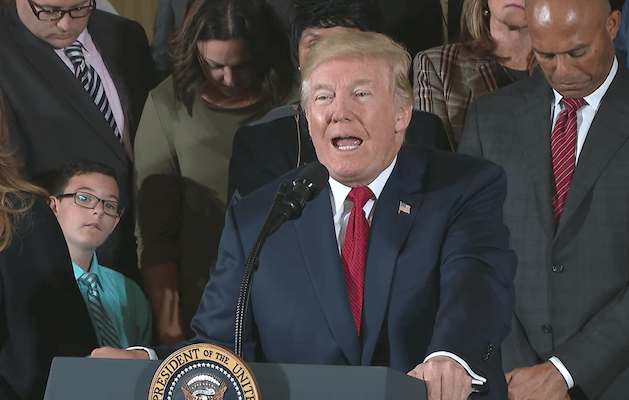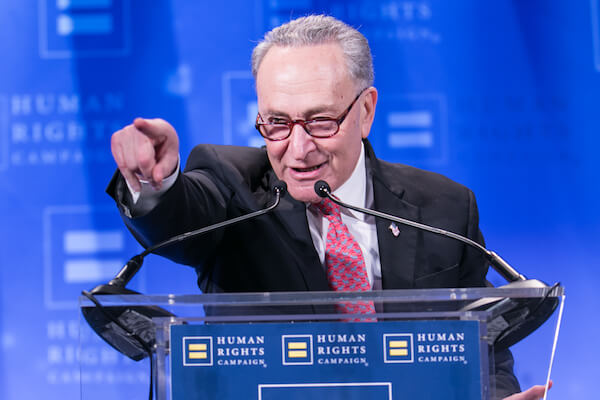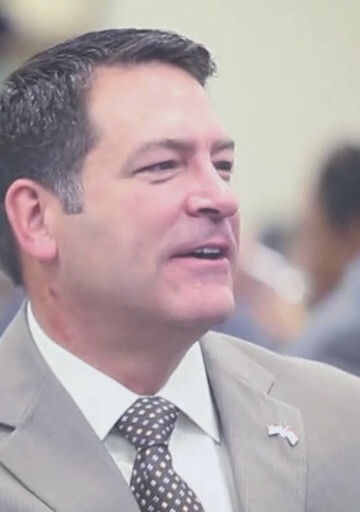City Council Speaker Corey Johnson with Senator Chuck Schumer, who administered Johnson’s official oath of office at an FIT ceremony on January 28. | CHRISTIAN MILES
Every seat in the Fashion Institute of Technology’s Morris W. and Fannie B. Haft Theater, capacity 700, was filled by the time City Council Speaker Corey Johnson’s formal inauguration opened on January 28. Musical performances by students from PS 111 and PS 51 created a hopeful mood with “This Land Is Your Land” along with the Shaker melody “Simple Gifts.” In the ceremony’s opening remarks, Aleta Lafargue, president of the Tenants’ Association at Manhattan Plaza, said, “I know I speak for everyone when I say that if you’re on the West Side, Corey is much more than an elected public official. To so many of us across our district he is a friend, a neighbor, a surrogate son, a mentor, a mentee, a role model, a fighter.”
Mayor Bill de Blasio reminded the audience that after the November 2016 election, “One of the people in this city who stood up the quickest, with the most fortitude, who started to organize his community to resist and to make sure values stay strong, was Corey Johnson.” He added that New York City was sending a message to the whole country “that an HIV-positive man is one of the great leaders of our city.”
De Blasio talked about Johnson’s origins in a small town in Massachusetts and how 20 years ago he came out “in a world where almost no one did it, in a culture and athletic culture that so tragically rejected people’s truth.” He referred to the close connection Johnson has to his mother who was unable to attend, and added, “Corey is not a moderate. You don’t do things in moderation. You do it with all your energy and heart and became an activist, a community activist, a fighter for LGBT rights, a civic leader, and the youngest community board chair in the city.”
Speaker’s inauguration emphasizes his hardscrabble personal story, hard work ahead
Before administering the oath of office, US Senator Chuck Schumer, like de Blasio, referred to Johnson’s childhood, specifically his upbringing in public housing.
“His family struggled, and struggled, and struggled, but Corey had some inner strength, a great gift from God, and he became captain of his football team, and he came out and said, ‘I’m gay,’” Schumer said, lauding him as “a fighter to stand up for who we are and what we believe in.”
Comptroller Scott Stringer, in what was perhaps a dig at the mayor, praised Johnson for his potential to make the Council a “Council of Independence.” Alphonso David, the out gay counsel to Governor Andrew Cuomo, described Johnson as “the disruptor, the underdog, the fighter, and now the speaker of the NYC Council,” who “has never forgotten how important it is to remain humble, how important it is to fight for the things that absolutely matter.”
Finally at the podium, after been unable earlier in the program to stop himself from dancing to “Ain’t No Stoppin’ Us Now” sung by the New York City Community Chorus, Johnson took five minutes to offer thanks to a list of people that included a shout-out to each councilmember by first name.
He then spoke of the 14,703 doors he knocked on during the 2017 campaign and how he continues to be inspired by those he met.
“Each one of you has a unique incredible story and a unique set of life experiences and challenges that you’ve overcome,” he said. “You are what inspires me and motivates me every single day.”
Johnson highlighted accomplishments, including the pending public park on West 20th Street in Chelsea, a new historic district in the South Village, the 500 affordable housing units resulting from the Pier 40 negotiation, and a development with an indoor recreation facility and affordable supermarket. In spite of these wins, Johnson said, the city faces big challenges.
“The affordability crisis that grips our city threatens the very existence of our neighborhoods,” he warned. “People who lived in the same community for their entire lives find themselves priced out, unable to afford their rent or even their groceries. Many working families are literally living paycheck to paycheck. One missed shift or one medical expense away from eviction or bankruptcy.”
Johnson noted that the night before his inauguration ceremony, 61,000 people slept in shelters, 23,000 of them children under age 16.
“We must do better,” he said, vowing to extend rent protections and to work with state government “to finally once and for all close the loopholes that are allowing landlords to deregulate apartments.” Later, he noted that 22 percent of New Yorkers — 1.7 million people — are living below the poverty line. He made clear that affordable housing is a priority.
He spoke out for small businesses that are unable to compete with “deep-pocketed chain stores,” subway riders who are experiencing “years of disinvestment in our infrastructure,” and also “shameful racial disparities that persist in nearly every aspect of life in our city, including life expectancy, health outcomes, criminal justice and education.”
Johnson himself then referred to his personal story, saying, “When I came out in 1999 in a small town of 5,000 people 30 miles north of Boston, when I came out to my family, when I came out at school, I was three months before that literally suicidal. I was clinically depressed and I did not want to live anymore because I couldn’t accept myself and I was scared the world wouldn’t accept me. But I came out and I got the support and love that I needed, and ultimately I realized that I deserved. And that one moment of coming out was the chain reaction in a series of events.”
Life events broadened Johnson’s perspective and brought him to New York.
On this important late winter New York Sunday, he promised, “I will remember where I came from, I will remember the struggles that I faced, I will remember the adversity, and when difficult decisions have to be made, I will do it remembering all of you of course, but also the folks who aren’t here today, the single mom working two jobs, the public housing resident living in conditions that are not acceptable, the family whose landlord is harassing them, trying to deregulate where they live. I’ll remember these stories.”
































